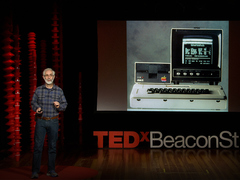fear, fun and filoz
WHAT COMES TO MIND - see also my site (short link) "t.ly/fRG5" in web address window
Tuesday, January 31, 2017
Monday, January 30, 2017
Talk on some good audiobooks
Listening
Where?
When?
How intently?
Professional narration
Good audio prices
Convenient file format
iPods
Podcasts
ear or eye
Ear comes first biologically
Ear is more widespread in nature
"The Universal Sense" by Seth Horowitz
"Space Between Words" by Paul Saenger
Prof. Sue Slick, reading emeritus: more people can hear than can read well
Getting audio books
Libraries: public and academic here and elsewhere
McMillan Library in Rapids is impressive
Libraries are connected these days
Audiobooks are downloadable
OverDrive, Amazon, Audible.com, Great Courses - all have apps, web sites
Library and purchase
Library can be free but possibly long waits
Get enough going and the wait is irrelevant
Notifications
Best prices I have found: Audible.com with annual membership
Also narrative on Amazon along with ebook
Attention and retention
Amazon touts its Whispersync
Five good audiobooks
The Girl with the Dragon Tattoo
The Unlikely Pilgrimage of Harold Fry
The Demon Under the Microscope
Lab Girl
Outsmart Yourself
Girl with the Dragon Tattoo
Author died right after final volume
Another author took up the story
The Girl in the Spider's Web
Unlikely Pilgrimage of Harold Fry
Demon Under the Microscope
Lab Girl
Outsmart Yourself
12.5 hours
by Prof. Peter Vishton, PhD
Up-to-date psych research
Great Course
Sunday, January 29, 2017
The downside of mindfulness
I thought the lack of self-awareness, of more and more shuffling thoughtlessly through life was sloth, laziness. But despite the tons of evidence, practice and talk about being aware, being awake, even being alert to what is going on in my own mind, I find that mindful living definitely has a downside.
Maybe you have had an experience with your rabbi or priest or pastor or minister, where you were the subject of a bit of close questioning about your motives and your behavior. "So, Billy, why do you think you took your brother's batting trophy and pitched into the furnace?" With a little help from Minister Wilkins, I could unmask my feelings and see my jealousy, my spite, my interest in erasing my brother's accomplishment.
With meditation, I found that I imported Minister Wilkins right into me. Sitting quietly with myself, getting to see and know more of the real me, I can spot my thoughts as they whiz by. I can see my emotions: confusion, distaste, grumpiness, an urge to go wild and an urge to crawl back under the covers. What they say is true: yes, I can see a desire to melt my brother's batting trophy down to a big metal splat without acting on the desire. I can just observe. But that is the trouble - seeing one wicked, two childish, three stale urges, seeing good ideas mixed with trashy ones day after day can be depressing. A guy could come to doubt he is the very greatest. He could even come to believe he is lucky to be what he is, to have what he has, to have accomplished that much.
Saturday, January 28, 2017
Blossoming projections
A cartoon by Carolita Johnson in the New Yorker of Jan. 16, 2017 shows a young mother dressing while her little daughter asks, "Mommy, when will I blossom into a beautiful projection of male desire?" Sex, at least among mammalian species, is an odd deal. For some, it means little. An occasional meeting somewhere in the forest, perhaps never to meet again. I have no idea what the fertility rate among bears, deer, or wolves is, but I do know that humans have gone out of their way to engage in sex without pregnancy. Still, reproduction or not, bodies, voices, gestures and social mores such as typical personality traits underline and emphasize our genders all day long.
As one ages and gets a chance to more or less view life in its entirety, male desire, and I guess female desire, show themselves to include many ideas and projections, concepts and standards and expectations that are a bit vague, a bit unreliable, maybe a bit unsteady. When you think of young people being entranced by the whole business of attraction and starting a long relationship, it seems unlikely that the lovely skin and zest and brightness can wrinkle and fade without removing the fun and connections between people but it does happen. Even older people who by fate or choice or both are not paired are affected by the biological markers of sex. Watch 80 year olds and you will see many of the same instant adjustments to the sex of others that you can see among 20 year olds.
Nobody wants to suffer or lose or be restrained just because of the gender accident of birth but our awareness and our projections from Mommy and Daddy, from our siblings, from grade school and high school and movies and stories and dreams and hopes and aversions have strong sexual colors in them right along. Our marketing and our genetics are likely to keep things that way for a long time.
Friday, January 27, 2017
Time Warp in Our Basement
Every time Lynn goes downstairs to her clay-working area, she falls into a time warp. It is always later when she emerges that she thinks it will be. I have checked and the clock down there keeps the same time as all the other clocks so I can't figure out why time is different for her down there.
Years ago, we both took the Myers-Briggs Type Indicator. It is a personality inventory that divides people into one side or the other of four personality types, inspired by Carl Jung and created by a mother-daughter team who were aware of the work done by the US armed forces during World War I. That work involved attempts to evaluate intelligence but the Myers-Briggs team wanted to create a test for personality. Jung thought that human personality was deeply influenced by the extroversion-introversion scale, where the extrovert expresses thoughts openly and the introvert keeps more of his thoughts inside. He also felt people tend to be "sensors" or "intuitives", people who pay attention to input from their eyes, ears and other senses or those who are more guided by what they have on their minds.
The third dichotomy was whether the person tended to be guided by thoughts or by emotions and the fourth split was whether the person liked making decisions and did so frequently or felt better gathering information in support of a decision and tended to put off making decisions.
The two of us are pretty similar on the first three dimensions but, especially when something is important, Lynn tends more to the information-gathering side than I do. Why the judgers like me tend to be more continuously aware of what time it is than the "perceivers" I don't know but they often do.
Once Lynn said,"Let's go for a walk" and I said,"For how long?" She said,"I don't know for how long, probably until we get back." She can go on a walk and look at what she sees. When I go for a walk, I keep wondering when it is going to end. I may not especially want it to end but I have the question of duration in the back of my mind.
This set of personality variables is not at the forefront of many personality investigators these days. The more agreed upon set is often called The Big Five. They are extraversion, agreeableness, openness, conscientiousness and neuroticism. These variables have been more investigated and studied recently.
You may notice that "extroversion" is spelled differently from "extraversion". I learned the "o" way so it is more comfortable for me. You may also know that Susan Cain (see her "Quiet: The Power of Introverts in a World that Can't Stop Talking") and others are promoting more respect and awareness of the introvert type, despite the fact that the louder, more noticeable and gregarious extroverts often get first billing.
Monday, January 23, 2017
Fwd: March
From: Lynn Kirby
Date: Mon, Jan 23, 2017 at 9:15 AM
Subject: March
To: William Kirby <olderkirby@gmail.com>
http://wakingtimesmedia.com/
Fwd: The link to the pics
From: Lynn Kirby <lkirby39@gmail.com>
Date: Mon, Jan 23, 2017 at 8:54 AM
Subject: The link to the pics
To: William Kirby <olderkirby@gmail.com>
https://www.nytimes.com/
Saturday, January 14, 2017
Fwd: There's a better way to talk about love
From: This week on TED.com <no_reply@ted.com>
Date: Sat, Jan 14, 2017 at 7:48 AM
Subject: There's a better way to talk about love
To: olderkirby@gmail.com
| Catch up on TED Talks from this week. January 14, 2017 |
| ||||
| ||||
| ||||
| ||||
| ||||
| ||||
| ||||
|
|
Friday, January 13, 2017
Fwd:
From: Bill Kirby (olderkirby) <olderkirby@gmail.com>
Date: Fri, Jan 13, 2017 at 4:14 PM
Subject:
To: olderkirby@gmail.com
Thursday, January 12, 2017
Fwd: Arizona 1/12/17
From: Lynn Kirby <lkirby39@gmail.com>
Date: Thu, Jan 12, 2017 at 9:04 PM
Subject: Arizona 1/12/17
Wednesday, January 11, 2017
Yes, I read the book
I remember sitting and looking at all the words. Ok, not on all the pages. I didn't read the back of the title page, that information about the publisher and the editions and so on.
Ok, not with equal attention. There were some words I emphasized, as when I came to the sentence stating the identity of the murderer. Naturally, as a user of English since my early days, I would probably notice if the identifying sentence said "a murderer" instead of "the murderer". In English, we take our articles seriously and there are important crime-solving difference between being THE murderer the police seek and being A murderer they haven't even known about.
It would have taken much longer and not have been as interesting or helpful if I had given each word or even each paragraph equal attention. My attention seems, like most people, to be built to hop and jump. Probably derives from evolutionary history and better survival if I can my surrounding for approaching tigers. I feel as though my attention was on the book thoroughly and I want to get credit in your course and in my mind as having read it.
So, you want to test me on the book, eh? You have written a set of test items related to the book and its meaning and you feel that anyone who has read the book can answer those questions to your satisfaction. Further, you feel that not doing well on your test is good evidence of my not having read the damned book or having only read it poorly or partially or without good "comprehension".
You wrote the book, right? So, let me ask you a few questions. What is the first word in the first sentence? What is the last word in the last sentence? Sorry, you did not answer such simple questions about a book that you yourself wrote. Ok, you wrote it ten years ago. And yes, in writing it and working on it for publication, you did read and re-read it over many times.
As a reader of your book, I was surprised that you made the murderer left-handed. You know, I have several loved ones who are left-handed and am not happy to see left-handedness associated with anti-social behavior, the political party the villain supports or her liking for basil perfume. I assume "you didn't mean anything by" the association you built but you know, I got me thinking. I bet your parents never really loved you, did they?
To go on with this topic, consider this page and the statements made:
https://www.quora.com/What-
Tuesday, January 10, 2017
Have you read the book?
Recently we read Victoria Houston's "Dead Water" and we are now reading "The Survival of the Sickest" by Sharon Moalem. For more than 50 years, I have read aloud to Lynn while she assembles jigsaw puzzles or knits or something else. I like to read aloud, although I suspect that sometimes my comprehension and retention is better when I read to myself silently. '
A very eye-opening book was "Space Between Words: The Origins of Silent Reading" by Paul Saenger. The author described just what we did in 10th grade Latin class reading Caesar's Gallic Wars. The words were written without capital letters at the beginning of a sentence and without periods, question marks or exclamation marks at the end. It took plenty of effort and thinking and looking and comparing to find a subject and its corresponding verb. We had already learned to read silently and we considered it to be poor manners if different readers in the room, reading or trying to decipher, spoke aloud what they were working on. Before the modern layout of words, spaces, capitals and end punctuation, a room of readers, as in a library reading room, was a noisy place. Those trying to decipher would use their voices to say aloud what they thought they were onto.
One other thing I didn't mention was the effect of writing words without the invention of spaces between them. Youcanseethatitwouldbeslowera
Our modern conventions make reading faster and easier. Our way allows interesting, exciting concepts to just flow into our head.
Sunday, January 8, 2017
Contribution from Richard L. Evans
January 5, Toward 2017 Volume 24 Issue The 14
Toward the Light
Your comments or contributions are welcome. Contact the editor at evansrichard911@gmail.com. Books by the editor: Life of the Eagle The Short Happy Life of Davey Monroe
Humor and inspiration published weekly (or whenever the editor feels like it) Fare: $ Priceless
------------------------------
TEACHER (author unknown)
Let me get this right . . . You want me to go into that room with all those kids and fill their every waking moment with love for learning.
Not only that, I'm supposed to instill a sense of pride in their ethnicity, behaviorally modify disruptive behavior, and observe them for signs of abuse and T-shirt messages. I am to fight the war on drugs and sexually transmitted diseases, check their backpacks for guns and raise their self-esteem. I'm to teach them patriotism, good citizenship, sportsmanship and fair play; how and where to register to vote; how to balance a checkbook, and how to apply for a job. I am to check their heads occasionally for lice; maintain a safe environment; recognize signs of potential antisocial behavior; offer advice; write letters of recommendation for student employment and scholarships; encourage respect for the cultural diversity of others and, oh yeah, always make sure that I give the girls in my class 50% of my attention.
I'm required by my contract to be working on my own time summer and evenings at my own expense toward advance certification and a master's degree and, after school, I am to attend committee and faculty meetings and participate in staff development training to maintain my employment status. I am to be a paragon of virtue larger than life such that my very presence will awe my students into being obedient and respectful of authority. I am to pledge allegiance to supporting family values, a return to the basics and to my current administration. I am to incorporate technology into the too personal relationship with each student. I am to decide who might be potentially dangerous and/or liable to commit crimes in school or who is possibly being abused and I can be sent to jail for not mentioning these suspicions.
I am to make sure all students pass the state and federally mandated testing and all classes, whether or not they attend school on a regular basis or complete any of the work assigned. Plus I am expected to make sure that all of the students with handicaps are guaranteed a free and equal
education, regardless of their mental or physical handicap. I am to communicate frequently with each student's parent by letter, phone, newsletter and grade card. I'm to do all of this with just a piece of chalk, a computer, a few books, a bulletin board, a 45 minute, more-or-less, planning time and a big smile—all on a starting salary that qualifies my family for food stamps in many states. Is that all?
And you want me do all of this—but you also expect me NOT TO PRAY?
Birthdays this week: Robert Duvall (86), Diane Keaton (71), Margaret O'Brien (80), Charlie Rose (75), Walter Mondale (89), Nicholas Cage (52), Rand Paul (53), Kim Jong-Un (33), R. Kelly (50), Stephen Hawking (74), Yvette Mimieux (78), Joan Baez (76), Crystal Gale (66), Catherine Duchess of Cambridge (35), Pat Benatar (64), Rod Stewart (72), George Foreman (69) and Naomi Judd (71).
THE SHAD TALE OF THE STURGEON by James Thom (adapted)
There was once a brilliant sturgeon on the staff of the local community health fishility. He was, in fact, one of its flounders. He was a whale of a guy—a fin fellow who would never shrimp from his responsibilities. He was successful and happy, always whistling a cheerful tuna.
One day, for no porpoise at all, a crabby patient decided to drum up a story. He told the sturgeon that his treatments were full of abalone, and had actually made him eel. He even conched him with a malpractice suit!
Buoy!—wasn't the sturgeon in a real pickerel? Without taking time to mullet over, the board demanded his oyster. The case smelt to high heaven, so at the herring the judge, with the wisdom of Salmon, denied the plaintiff's clam. Such a fishy story just would not stand up when perched on the scales of justice.
When the board then tried to hire the good sturgeon back, they found that he had hit the bottlenose pretty hard and had wound up on squid roe.
Holly mackerel!—Wasn't that a fine kettle of you-know-what?
© copyright 2017 R.L. Evans all rights reserved
Toward the Light is published and distributed without charge by the Editor: Richard L. Evans, 704 Country Club Court, Morehead City, NC 28557







